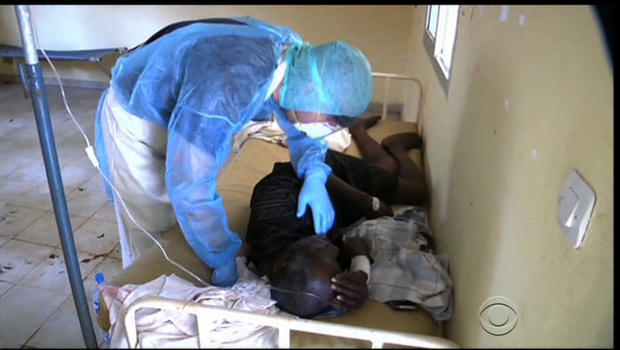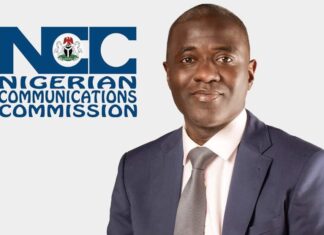Unease has grown just as Nigerians and foreigners alike have become sceptical about the country’s capability to prevent an outbreak of the Ebola virus since the report last week that the female doctor who treated Patrick Sawyer was infected.
To stop Ebola everyone who has come into contact with the virus must be isolated.
Sawyer, a Liberian-American, died at First Consultants Medical Centre, Obalende, Lagos on July 25, five days after arriving from Monrovia.
A female nurse who was also infected with the virus while treating him died on Tuesday, August 5.
Eight medical personnel had “primary contact” with Sawyer at the hospital, and two of the five being treated for Ebola virus at the isolation ward are in “critical conditions,” said Lagos State Health Commissioner, Jide Idris.
A total 139 people are under surveillance, with nine confirmed infected.
On Friday, August 8, the Nigerian National Petroleum Corporation (NNPC) Hospital on Muri Okunola Street, Victoria Island, Lagos, was shut down upon discovery of a patient brought for admission who had had contact with First Consultants Medical Centre.
President Goodluck Jonathan has asked both Health Minister, Onyebuchi Chukwu, and Information Minister, Labaran Maku, to give him an update on the developments.
Chukwu urged Nigerians to avoid large gatherings and religious leaders to join hands with Abuja to curtail Ebola.
The World Health Organisation (WHO) has warned that West African nations risk importing the virus.
“The Ebola outbreak in the West African region remains uncontained with the number of cases and deaths still increasing,” it said.
A pedestrian left to die
The fear that an Ebola epidemic would soon spread countrywide, killing almost everyone it touches, has created a nightmare scenario and kept public health officials and other segments of society on their toes.
The ripple effects are already being borne, especially in Lagos.
A ride on public transport in the megacity is no longer pleasant as passengers avoid body contact, especially if they sit next to someone who sweats.
Last week, bystanders watched a man who was knocked down by a hit and run driver in Oshodi, Lagos to die in the pool of his own blood. Nobody wanted to get close to him for fear of being infected with Ebola virus.
Gospel preachers on public transport have also met stiff opposition from fellow passengers who shout them down to avoid being infected through spittle that may splash while preachers talk.
Lull in businesses
Fruit sellers, road side food vendors and suya (meat kebab) sellers are worst hit.
Foluke Ogundeji, a fruit vendor in Agege, Lagos, said the scare threatens to take over her business of many years as more people are being careful.
“This Ebola disease is causing a lot of problems for many of us. I used to restock every other day, but now even doing so after three days is not feasible because people don’t buy fruits like before because of the fear of this disease.
“It is worse if customers meet me washing or packing the fruits out of water. They are wary about the water we use. These were things we didn’t encounter before and since fruits are perishable, I cannot afford to pile them.”
Jane Obi, a businesswoman, now washes her hands regularly and takes other sanitary measures advised by experts. She has also discouraged her husband from eating bush meat.
“Since experts say that the virus lives inside bush meats, I have told my husband no more bush meat, at least for now,” she stated.
One product that has received huge patronage since the Ebola scare is hand sanitiser. Maryam Audu, a student, said she has intensified its use and noticed that the product has become scarce as more people buy it.
Some believe that the fear of Ebola will be heightened if the virus finds its way into villages, many of which lack medical facilities.
Dilemma of burying relatives
“Our traditional attitude is to cater for sick relatives and even neighbours. How then do you now say we should quarantine suspected cases and watch them die?” wondered Chukwudi Nwoke, a trader.
“The worst is that if that person happens to die, what we heard is that even the corpse of the victim is more dangerous, how then do we dress the corpse and give the person a proper burial, or are we to watch the body decompose? That I even think is more dangerous to people.”
However, both the federal and Lagos State governments insist that there is no need to panic.
Modes of transmission
Idris explained that the mode of transmission of the Ebola virus is through direct contact with broken skin, mucous membranes and secretions of an infected person or through direct contact with materials and surfaces contaminated by an infected person.
“This is a call for vigilance as human to human transmission is only achieved by physical contact with a person who is acutely and gravely ill from Ebola virus through body fluids such as blood, urine, stool, saliva, breast milk and semen.
“Burial ceremonies where mourners, including family members, have direct contact with patients who died of Ebola have also played a role in the spread of the disease,” Idris said.
Infection has also occurred through the handling of infected chimpanzees, monkeys, gorillas, fruit bats, antelopes and porcupine.
There has been no case of transmission by domestic animals like pigs.
Abuja sets up research team
The federal government has constituted a research team to find a vaccine or drug to cure Ebola. Chukwu told the team at its inauguration in Abuja on Monday, August 4 to:
• Carry out research into the treatment of the virus.
• Receive and verify claims relating to its treatment, including the uncompleted work done by Professor Maurice Iwu and his team.
• Collate and analyse related research findings.
• Advice the government from time to time.
The group is co-chaired by the Director General of the National Institute of Pharmaceutical Research and Development, Professor S.K. Gamaliel, and Director General of the Nigerian Institute of Medical Research, Professor Innocent Uja.
Iwu, former Independent National Electoral Commission (INEC) Chairman, is a professor of phamarcognosy.
America provides support
As part of a global effort to combat the disease, the United States has announced plans to send at least 50 public health experts to West Africa this month.
A senior U.S. health official said the outbreak is currently out of control but can be stopped.
The BBC reported that two American aid workers who contracted Ebola in Liberia appear to be improving after receiving an experimental drug, ZMapp.
But it is not clear if ZMapp, which has only been tested on monkeys, can be credited with their improvement.
Kent Brantly was flown back to the U.S. for treatment on Saturday, August 2. His colleague, Nancy Writebol, arrived back on Tuesday, August 5.
Figures compiled by the World Health Organisation (WHO) showed that the death toll from the deadly virus has risen from 729 to 960 spread across Guinea, Sierra Leone, Liberia and Nigeria.
The death toll includes a Saudi man who died in Saudi Arabia on Thursday, August 7 after he was infected during a visit to Sierra Leone.
WHO swings into action
The WHO, which declared Ebola “an international emergency”, has sent a team of experts to Lagos to work with the federal and state governments on how to prevent an outbreak.
Members of the team include WHO regional and headquarters experts comprising an epidemiologist and a case management specialist.
“With this assistance, WHO has since made available its guidelines and tools as well as use them to assist in training various categories of health workers on contact tracing, surveillance, laboratory diagnosis, Ebola case management, infection prevention and control and public health education using WHO Standard Operating Procedures, to support the country’s efforts in containing further spread of Ebola virus,” the WHO said in a statement.
“The WHO tools provided also include, job aids, database software and training aids.
“WHO also provided personal protective equipment (PPE) and thermometers to supplement on those being sourced by the government. The team remains in Lagos to provide technical guidance and assist in closely monitoring the situation.”
West African countries have begun regional efforts to contain the spread of Ebola.
A four-man delegation has visited Togo to create epidemiological surveillance centres for beneficiary countries under the West African Disease Surveillance (WARDS) project.
Other tasks are expected to follow in the coming weeks.
But the region, comprising 15 member states, needs to invest at least $50 million for an effective response.
The campaign against the virus is being hampered by a lack of financial and medical resources to respond to epidemic outbreaks in any single country in West Africa.
The West African Health Organisation (WAHO) said besides measures announced by health ministers the countries must “implement synchronised cross-border interventions.”
Other measures include strengthening prevention, surveillance of active cases, treatment and care of suspected cases, multi-sectorial coordination and collaboration, raising logistic and material support, as well as social mobilisation in Guinea, Liberia and Sierra Leone where Ebola has hit hard.













